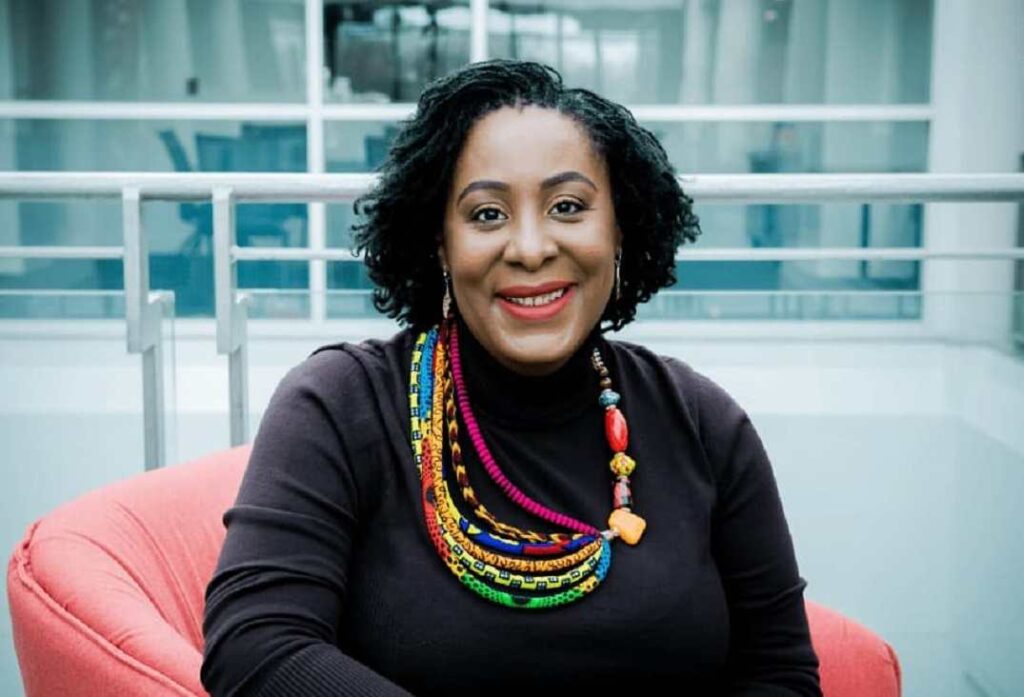
Who is Uju Anya?
Uju Anya is a Nigerian-born professor, author and researcher. Her research interests include Applied Linguistics, Second Language Learning and Language Pedagogy. Her website describes her as a researcher in applied linguistics, critical sociolinguistics and critical discourse studies, primarily examining race.
Uju Anya stirred hot media debate in September 2022 when she described late Queen Elizabeth II in a tweet as the “chief monarch of a thieving, raping, genocidal empire” and wished her “excruciating pain” in her later days. Anya made the tweet shortly after news of Queen Elizabeth’s death became public. Though Twitter had taken down the tweet for violation of its policies, screenshots of it kept spreading across multiple social media platforms. The controversial tweet stirred mixed reactions among social media users with some justifying Anya’s anger toward the British monarchy and others criticising her.
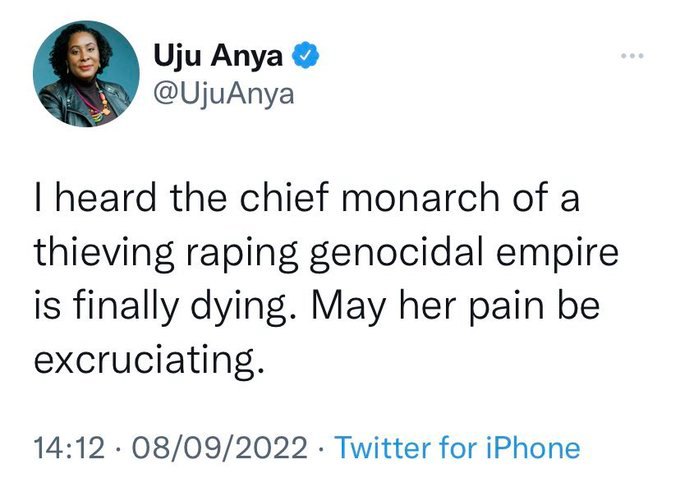
Uju Anya’s Early Life and Education
Uju Anya was born on August 4, 1976, to a Nigerian father and a Trinidadian mother. As of September 2022, Uju Anya is 46 years old. She is from Enugu state, Nigeria. Uju Anya spent the first ten years of her life in Nigeria before moving to the United States with her mother and older brother.
Uju Anya and her family relocated to Montgomery county, Maryland, USA where she attended a local high school. She later graduated with a Bachelor of Arts degree in Romance Languages from Dartmouth College in 1998. She then got an MA in Brazilian Studies from Brown University in 2001. As of the time of writing, Uju Anya holds a PhD in Applied Linguistics from UCLA. She bagged the doctorate in 2011.
About Uju Anya’s parents
According to information gathered by DNB Stories Africa, Uju Anya’s parents met and married in the United Kingdom before returning to Nigeria. Uju Anya revealed that during the Biafran war, her father left her mother with his family and went off with his mistress. When Uju Anya’s father eventually brought in one of his mistresses and married her, Uju Anya’s mother began to plot her escape.
Uju Anya described her parents’ relationship as chaotic and her father as a philanderer and a whoremonger. In 1986, when Uju Anya was ten, her mother took her and her 13-year-old brother and fled to the United States, leaving her older siblings who were above eighteen years old behind. Uju Anya’s older siblings reunited with the rest of the family later.
About Uju Anya’s siblings
The total number of Uju Anya’s siblings is currently unknown. However, it is known that she relocated to the United States with her mother and her older brother who was 13 at the time. She also has other older siblings.
Anya revealed that one of her older siblings who was sent to the United Kingdom to study spent his years liquidating all of their parents’ funds instead. She added that her parents had about £100,000 in accounts and property in England at the time. Years later, Uju Anya’s mother learned that her son was renting a luxury flat on the street, instead of staying in the student dormitory, throwing cocaine parties with Arabs and calling himself an African prince.
Uju Anya’s parents found out about their son’s extravagant lifestyle after he was arrested for embezzlement. They then discovered that he had completely exhausted their resources.
Uju Anya said:
“Mom said her greatest disgrace in life was travelling from Nigeria to England to collect the child she dropped off at the University from prison.”
How Uju Anya started her career
Uju Anya started her career as a teaching fellow with the Phillips Academy in Andover in 1998. There, she taught introductory and intermediate-level high school immersion Spanish classes. In 2001, she became a visiting lecturer in Portuguese at the Department of Spanish and Portuguese at Dartmouth College. She also worked as a lecturer of Spanish and Portuguese languages at UCLA from 2005 to 2007. Anya is currently a Professor of Second Language Acquisition at the Department of Modern Languages Associate at Carnegie Mellon University. She can speak six languages: Igbo, Spanish, Italian, English, Russian and Portuguese.
Uju Anya’s wiki profile
| Full Name | Uju Anya |
| Place of Birth | Enugu State, Nigeria |
| Nationality | Nigerian, Trinidadian, American |
| Date of Birth | August 4, 1976 |
| Age | 46 years old |
| Occupation | University professor |
| Marital status | Divorced |
| Children | Two |
| Current partner | Dr Sirry Alang |
| Almamater | Dartmouth College, Brown University and UCLA |
| Net worth | $1 million (estimated) |
| Social media | Twitter – @UjuAnya Instagram – @ujuanya |
About Uju Anya’s Sexuality
Uju Anya is openly lesbian. She revealed that as an adolescent, she was attracted to boys and girls which led her to believe then that she was bisexual. She eventually realized she only liked women after she married a man. Anya is now openly lesbian after her divorce from her ex-husband.
Anya revealed that she started dating women when she was away in school. According to her, she became openly queer when she was in college and had rented her own place. Uju Anya added that the place where her family formerly lived was rigid in their religious beliefs so she couldn’t fully be herself.
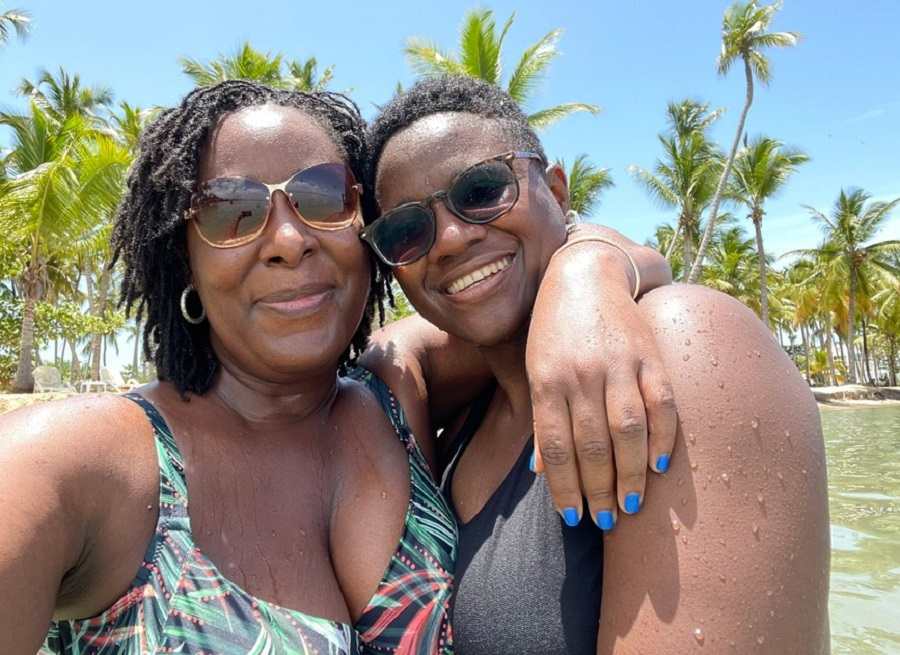
About Uju Anya’s marriage and wedding
Uju Anya was previously married to a man before their divorce in 2021. Since divorcing her ex-husband, Professor Anya now only dates women. According to reports, she currently has a lesbian partner named Dr Sirry Alang who she has been with for quite a while.
About Uju Anya’s ex-husband
The identity of Uju Anya’s ex-husband is currently unknown. Uju Anya admitted that before her marriage to her now ex-husband, she had been under pressure to get married and settle down. She added that despite pressure, she did not get married under duress as she was passionately in love with her ex. During their marriage, Uju Anya and her ex had two children together. She added that she did not hide her sexuality from her then-husband.
Speaking about her previous marriage, Uju Anya said:
“He knew I loved women, and during the marriage, I was openly bisexual. Eventually, towards the end of our marriage, I realised I was not bisexual. I was a lesbian and that was what broke us up. I couldn’t continue living with a man knowing I exclusively wanted women.”
According to information gathered by DNB Stories Africa, Uju Anya and her ex-husband were legally separated since 2012 but their divorce proceedings were not finalized until January 2021. Uju Anya is now in a relationship with another lesbian woman.
Uju Anya’s lesbian partner
According to reports, Carnegie Mellon University professor Uju Anya is currently in a relationship with her lesbian partner Dr Sirry Alang. As per her website, Dr Sirry Alang is a medical sociologist and health services researcher based in America. Detailed information about Uju Anya’s lesbian partner is still scarce in the media at this time.
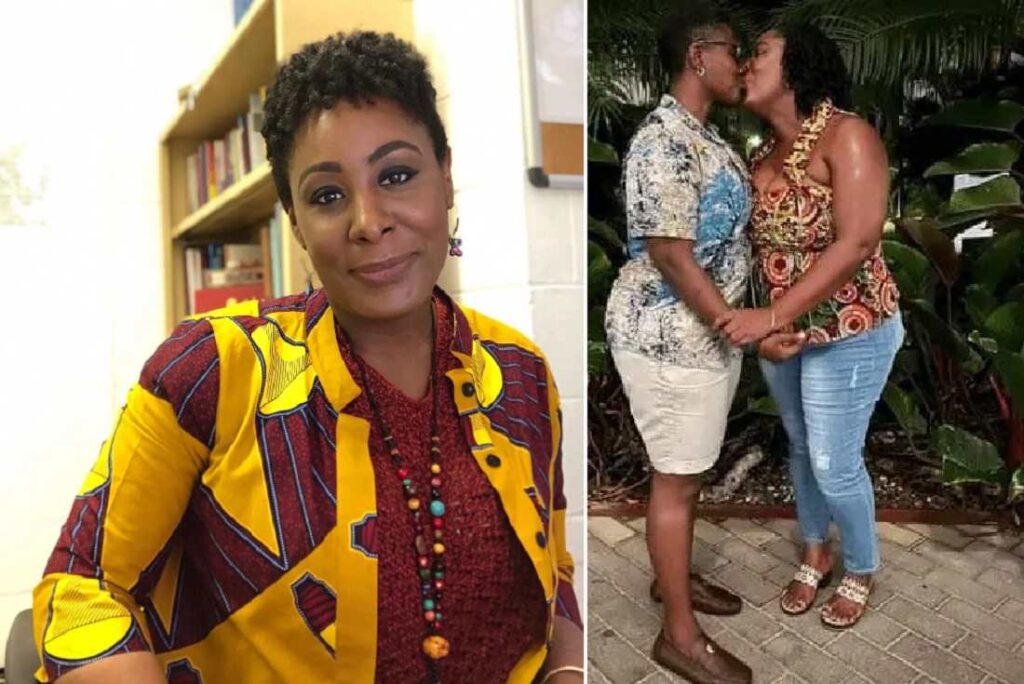
About Uju Anya’s children
Uju Anya has two children, both from her previous marriage. Their identities are currently unknown.
About Uju Anya’s controversial tweets
Hours before the death of Queen Elizabeth II was officially announced, Uju Anya tweeted:
“I heard the chief monarch of a thieving, raping, genocidal empire is finally dying. May her pain be excruciating.”
The tweet, which has since been taken down by Twitter sparked a lot of reactions and outrage. Prominent figures like Jeff Bezos responded to the tweet.
Bezos tweeted in response to Anya’s tweet:
“This is someone supposedly working to make the world better? I don’t think so. Wow.”
Uju Anya clapped back at Jeff Bezos, writing:
“May everyone you and your merciless greed have harmed in this world remember you as fondly as I remember my colonizers.”
Anya explained her anger with the British monarchy in a later statement, referencing Britain’s role in the Biafran genocide. It is reported that during the Biafran War, the United Kingdom provided the Nigerian army with weapons.
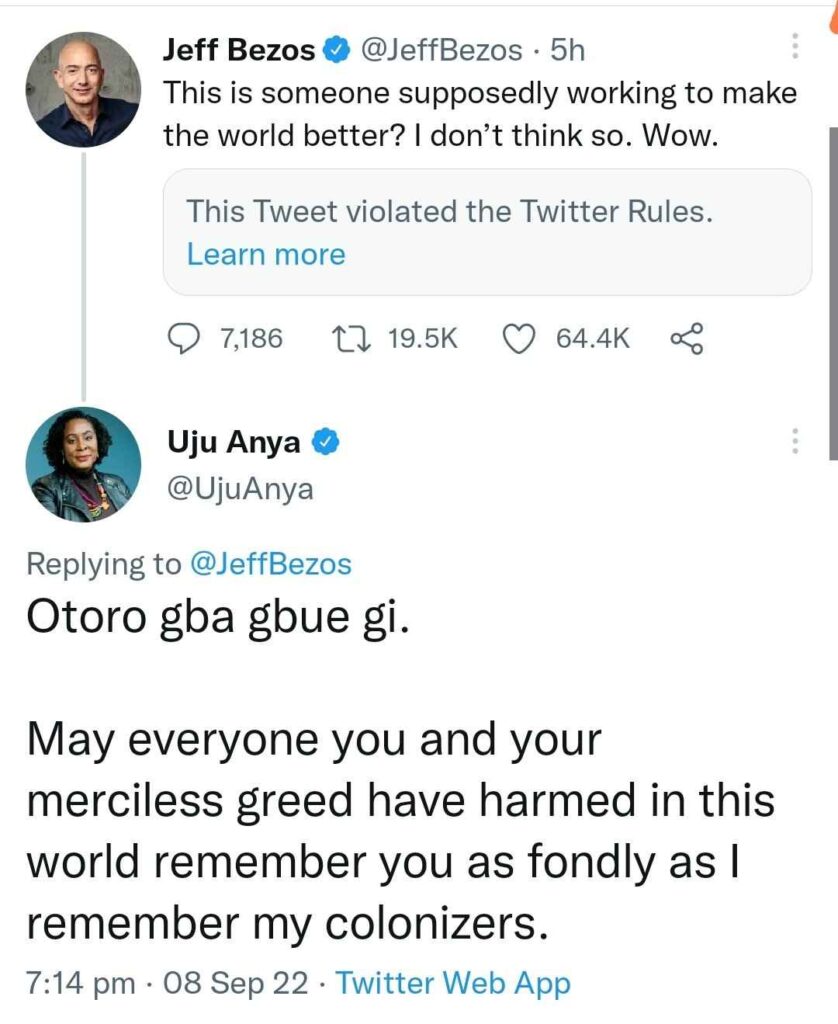
Uju Anya wrote:
“If anyone expects me to express anything but disdain for the monarch who supervised a government that sponsored the genocide that massacred and displaced half my family and the consequences of which those alive today are still trying to overcome, you can keep wishing upon a star.”
Carnegie Mellon University, the institution where Uju Anya works, has renounced her opinion of the late Queen, stating that it is not the opinion of the institution. Uju Anya is from Nigeria which was a British colony until 1960.
About Uju Anya’s net worth
As of 2022, Uju Anya has an estimated net worth of around $1 million. Her main sources of income are her career as a lecturer and an author.

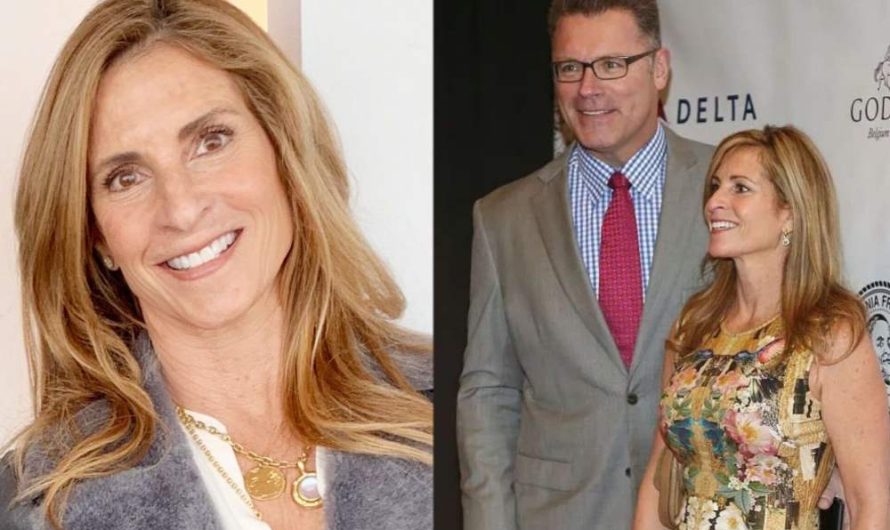

Prof. Anya was born six years after the end the Nigerian Civil War. Her knowledge about the war came from the stories she must have been told. There are always two sides to every story. Her bitterness may be the results of her own life experience, family background, family life, etc. Bitterness however is a very futile emotion that does not repair the damage of the past nor improve the prospect of the future. Rwanda today is one of the fast developing African countries today because they didn’t tie themselves down to the tragedy of the past intercine genocide. To most people, the Queen had a glorious reign. She was human, lived in a human society with all its failings and had the grace to live for 96 years and died in a manner many people will wish to die. Adieu Queen Elizabeth II.
NO more grant funds for Mellon University…my family has supported students since 1906…never again….”thousands of students cheering the death (of anybody) is not supportable…several other grant programs are joining our own to determine if it is better money to children…and let these students use their own funding for their terrorism and hate .. Queen Elizabeth…beloved by millions died peacefully the day after this “professor” Twitter insanity… May her death be excruciting” rather the pain of no grants…no wages; “professor”
Anya is twisting her own history…Nigerians “revolution” was a crude oil massacre. Nigerian troops (mercenaries) slaughtered the helpless unarmed OGONI farmers (land crude oil) and machine guns slaughtered men women and children so rapidly there was no time to bury the dead…rivers ran red with blood for miles…financed by Shell Oil (Islam owns) and Dupont Chemicals (plastics-crude oil) President George Bush Sr “Burning Bush” was investing in Arbusco Oil and Viet Nam..crude oil…again our husbands and sons=oil $
Nigerian slaughter and twisted to serve themselves…is as… insane as Anye “may the queens death be excruciating” was in “The Cut” magazine “favorite of Meghan Markle” published in China..now in war talks with Russia and Islam (nuclear missles and chemical warfare) …Meghan Markle has been paid over $300 million to beat the drums of hate royals and these millions are all coming from nations..planning to attack the United States and Great Britain a small group of nations surrounded by nations which pipe bombed London subways or 911. If King Charles does not strike (end) Meghan royal titles now..God help him!
I will like to talk with her
Compared to Queen Elizabeth II, Uju Anya is a nobody but our Media turned her into somebody.
She is a pathological liar as was born not in a colonized but in a free Nigeria. So she did not experience colonialism but the inner conflicts of a new republic.
Why is she here in the US when she should be in her home country to better conditions there, to prevent the kidnapping of hundreds of little girls and other conflicts there? Is it possible that her vicious political speech and lesbian lifestyle would not be tolerated as much as in our country?
She should certainly return to Nigeria instead of poisoning the mind of young people in our country.
WHY UJU ANYA GOT IT WRONG ON HER REMARK ABOUT QUEEN ELIZABETH II AND JEFF BEZOS
It is true that the tweets by a don from Carnegie Mellon University, Prof. Uju Anya, in the wake of the passing on of Her Majesty, Queen Elizabeth II, attracted a massive social media response without her knowing the reason for it. She has said that she was propelled by the reactions to post an additional tweet, when she realises a reply came from an unexpected person as Jeff Bezos. She alleges that by the wordings of his response, he was instigating violence against her. I have carefully read through the controversial posting on social media and I would think blaming the Queen over Her Majesty’s role in the Nigerian Civil War and insisting on the same position with an additional tweet doesn’t offer a compelling narrative on the situation at the moment. There are many issues troubling leaders in the contemporary international system that they tend to focus on critical issues and distinct ways of solving pending problems, rather than reflect on things that mirror a seemingly fixation or an unchanging state of mind on past occurrences. There is no doubt that Jeff Bozos was shocked by her disposition when he sighted her tweet on twitter. Certainly, he did not expect such comments on the Queen from a person of her status going by the prevailing circumstances, especially when she has been perceived to be a university don from a high-standing institution such as Carnegie Mellon University. I would reason that the backlash of tweets from the responses might have been triggered from this same thinking. The reality is that the tone of Uju Anya’s expression as a university professor didn’t meet the expectations of twitter users, given the groaning moment of the Queen, if at all as portrayed by her.
Perhaps, the ordinary observer of the scene views her comments as outrageous. Importantly, they appear not only to lack any technique or measure for overcoming social injustice and ending wars as she would want to project at the moment, rather it was felt as if her thought pattern was influencing an attitude of mind or such behaviour that displays a negative prejudice which the modern world sees as part of the social forces of oppression today. There is a need to elucidate further to the point of clarity and understanding of Prof. Uju Anya that, in spite the strong feeling that women sometimes are unable to see war and peace through the bravest eyes as expected of them, the fact remains that “war is the failure of politics and diplomacy”. It is evident that prior to the escalation of conflicts resulting into Nigerian-Biafra Civil War, the ensuing diplomacy failed. So, the indigenous leaders of the then warring parties ought to be blamed for the numerous deaths and losses, and for lacking the capacity to foster good negotiations on the diplomatic plane. The inability to manage events on the thrust of protecting our domestic prestige as a fledging nation-state made the disputing parties unable to avert the war. On the contrary, it would have been better that the idea to sell the agenda of addressing any perceived injustice would have been well framed. Notwithstanding, the emerging world tends to frown at such untimely outbursts which do not only denigrate one of the world’s most important persons, but presenting a false argument which attribute Nigeria’s woes as a result of the civil war to the Queen at such moments when she deserved care and empathy from any modest woman. I would think the lure to wish Her Majesty, the Queen, excruciating pain was a mere demonstration of suppressed anger built over decades of misinformation. This kind of practice is not only uncalled for, but unafrican. It tends to demonstrate unforgiving spirit and a sense of being inhumane arising from someone seen not only as an academic and a supposedly celebrated scholar, but a model to upcoming generations. This viewpoint precisely might have been the cause of reactions that might have triggered the negative emotions from the several twitter users.
On a general role, I would incline toward the opinion that critical matters pertaining to effects of modern war indicate rather chillingly the problems that emerging nations face in contemporary times in using military forces to achieve political objectives. There are lessons to be learnt from our experience no matter how justifiable any claim may be, even with the current democratic experiment. In reality, it would have been better for Prof. Uju Anya to pursue her cause by learning to hinge her feelings on modern ways of solving problems. Many a time, one realizes that it is a matter of logical and critical thinking. For instance, the United States as a country once fought a civil war, but it contrived measures to deal with hate crimes. In this regard, one can possibly reason that if war can be avoided by art of securing peaceful means through diplomacy, and the disputing parties in the Nigerian system could avert war by act of diplomacy, then the mayhem that culminated in a civil war that was fought in a span of three years would have been averted. It is, therefore, unwise to blame the British and foreign leaders for such failure and bloodshed that cost the lives of our soldiers and nationals. This is a simple logic that should invariably exempt Her Majesty from the consequences of the conflict. At this point, it is ideal to postulate that the conflict leading to the Nigerian Civil War was caused by political, economic, cultural, ethnic and religious divide which preceded the nation’s independence. Yet, we have not developed the capacity to deal with problems of structural relations as a result of changing political institutions from the existing traditional systems.
The yawning gap for research and scholarship on relationship management makes it mandatory to re-appraise public relations as an endeavour to tackle the credibility crisis in the country which remains persisting. This need has been equally discouraged by classical thinking in universities, probably as a result of personal interests or egoistic tendencies. The need for collaboration and synergy in searching for alternatives to solving our immediate problems warrants such measures to foster the development of theory as well as professional engagement of the subject in line with emerging reality. Otherwise, it becomes more glaring as a fallacy to think linguistics is an academic subject on the same latitude with other communication disciplines. Likewise, the tweets symbolize Nigeria’s weakness in terms of inability to evolve a strategy for domestic alignment and to forge a national ethos with clarity of purpose to allow her citizens to be able to think alike both at home and abroad. In this dimension, the United States as a country where she presently teaches saw the need to develop the capacity of citizens to deal with pluralistic pressures. The tentative solution to the multiple dilemmas is to draw attention to the search for preferred ways to resolve our challenges as a developing nation. It is proper to realize that the British people were once under the control of the Romans before they were able to forge ahead to bring about an age-long superpower.
Indeed, there is an unrelenting importunity to conclude that nationalism is one of the most powerful forces in modern politics. The British equally made us to feel this way by heeding to the impression that this grows out of the sense that black people constitute more or less naturally into distinct groups. In this manner, it was possible for the young nation to resort to war due to the inability to render innocuous important dividing issues. Nevertheless, the source of ideas for the formation of Nigeria as a sovereign nation-state or self-governing political unit ought to have been questioned, or possibly set a modality for developing the framework that should bind the people together and allow them to freely express their feelings and needs as members of a single-entity without anyone being halt. It is, however, realised that without experience on the part of the local leaders, they naively abdicated this responsibility to the colonial masters. On their part, it was suspected that the British realised that nationalist sentiment had become pronounced following the napoleon wars of the early 1800s. The maverick way they administered the system merely indicated that they drew lessons from the feat of napoleon’s armies which conquered most of the Europe and stirred the resentment and sometimes the envy of many of the conquered people, an act which was unknown to our indigenous leaders. In Napoleon’s era, this illustration was particularly true in the case of Germany and Italy, as neither of the territories then was found to be was a unified country. The challenge currently is to take it upon ourselves to redefine the sense of purpose and vision of our country and never to leave the responsibility for our infiltrators. Many of those who still attach themselves to memories of Nigerian Civil War hide under such shadows of vengeance to commit untold atrocities. What we find in the institutions are simply regular occurrences of discriminatory practices that remind us of the past.
As against this background, it is expected that as an emerging nation we must get to know that the country requires a robust leadership that would bring about rapid transformation from decline and loss of focus to a thriving and prosperous entity. It behoves that now that Her Majesty has passed on, it’s better to forget the past and join Jeff Bezos and other nationals to mourn the late British monarch and the Leader of Commonwealth of Nations. Nigerians should learn new ways to perform up to their maximum potential and from the sermon on her funeral to strive for righteousness at personal and institutional levels. This means focusing on changing the political culture and infrastructure such that the citizens can provide the highest productivity possible. It implies that we must see the need to change the perceptions about national goals and the means to attain them at optimal level. In this sense, the education component of the strategy to achieve this has to be appraised with a view to looking into the errors of nontraditional managers of the nation-state in time past, and to prepare future undertakers for increasingly responsible roles. On the other hand, there is also a need to help traditional managers of state affairs to overcome their prejudices in thinking about and interacting with the constituents who are of a different ethnic divide. All segments of the people must support the enforcement of agreed tenets of managing the political system in a manner that encourages diversity and supports behaviour change. The dream of fostering the Nigerian brand is a challenging one and can be realised, if only we are willing to learn and can respect each other’s rights and feelings, regardless of our exposure, background, characteristics or even pattern of approach of the ethnic groups.
By James Dibang,
Consultant, Business Development Services.
N.B.: I taught at University Level in 2001/2002 Session
honestly, you just said my mind.